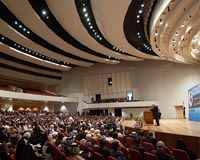| . |  |
. |
Sulaimaniyah, Iraq (AFP) Feb 21, 2011 A teenage protester was killed in a rally in northern Iraq as lawmakers moved to head off further demonstrations by cutting their salaries and ramping up support for the needy on Monday. The death of 17-year-old Serkho Mohammed on Sunday evening was the third fatality during protests in the autonomous region of Kurdistan, where thousands have hit the streets to rail against corruption in the city of Sulaimaniyah. Iraqi authorities have attempted to head off the protests, which have also taken place in other cities around the country in past weeks, by cutting politicians' pay, delaying plans to raise import tariffs and raising funds for a ration card programme that provides food to six million families. In Sulaimaniyah on Sunday, 1,500 protesters had attempted to march to Salem street in the centre of the city, the site of violent demonstrations that left two young men dead and 54 wounded on Thursday. But security forces blocked their progress, sparking Sunday's clashes. Mohammed, the lone fatality, suffered two gunshots to his abdomen after Kurdish security forces fired into the air in a bid to disperse the crowd, Sulaimaniyah provincial health chief Raykot Hama Rashid said. Rashid said 48 others were injured, including eight who were hit by bullets. The demonstrators had been attempting to move toward the headquarters of the Kurdistan Democratic Party (KDP) and Patriotic Union of Kurdistan (PUK) in Sulaimaniyah, 270 kilometres (170 miles) north of Baghdad. The KDP, led by regional president Massud Barzani, and the PUK, led by Iraqi President Jalal Talabani, have for decades lorded over Kurdistan. Along with the protests in Sulaimaniyah, demonstrations have also been staged in and around the southern cities of Kut, Nasiriyah, Diwaniyah and Basra, with the Kut rally leaving one person dead and dozens injured when security guards fired their weapons into the air. The rallies have focused on widespread corruption, high unemployment and poor basic services such as electricity and water provision. In response, Iraq's government announced Monday it would suspend a law that was to be implemented in two weeks that would raise tariffs on imports and thereby increase prices on products nationwide. The tariffs law was originally put on the books in December, before uprisings in Tunisia and Egypt sparked protests across the region, and had been due to come into effect on March 6. Duties were to range from zero to 80 percent of the value of products being imported. Tariffs for rice, sugar and antibiotics were set at five percent, while duties for cars were 15 percent. Iraqi MPs also passed legislation on Sunday evening that cut their salaries and those of ministers by 10 percent, a move that is projected to save nearly $5 million annually. The cuts, however, fell far short of more dramatic proposals pushed by the government that would have slashed pay by nearly 40 percent. Lawmakers also approved a 2011 spending programme that included nearly $1 billion in additional support for Iraq's ration card programme. Also late on Sunday, Iraq's top Shiite Muslim cleric Grand Ayatollah Ali al-Sistani said that while he understood the suffering of protesters across Iraq, there must be no bloodshed or attacks on property. "The religious authority understands the suffering which the Iraqi people are going through, due either to the negligence of the government or its weakness," said a letter distributed by his office in the holy city of Najaf. "Demonstrations are a guaranteed right for all citizens, but there must be no bloodshed, or attack on properties, public or private."
Share This Article With Planet Earth
Related Links Iraq: The first technology war of the 21st century
 Iraqi MPs pass $82-billion 2011 spending programme
Iraqi MPs pass $82-billion 2011 spending programmeBaghdad (AFP) Feb 20, 2011 Iraqi lawmakers approved an $82-billion spending programme for 2011 by voting for a national budget in parliament on Sunday. Overall expenditure will be $81.86 billion, or 96.6 trillion Iraqi dinars, while income is projected at $68.56 billion, leaving a shortfall of $13.3 billion - a budget deficit of around 16 percent. The budget is based on average oil prices of $76.5 per barrel and ... read more |
|
| The content herein, unless otherwise known to be public domain, are Copyright 1995-2010 - SpaceDaily. AFP and UPI Wire Stories are copyright Agence France-Presse and United Press International. ESA Portal Reports are copyright European Space Agency. All NASA sourced material is public domain. Additional copyrights may apply in whole or part to other bona fide parties. Advertising does not imply endorsement,agreement or approval of any opinions, statements or information provided by SpaceDaily on any Web page published or hosted by SpaceDaily. Privacy Statement |